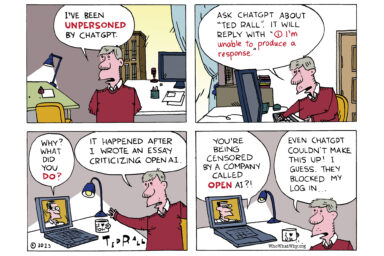Local journalism is being pulled in two directions. Congress is trying to help “journalism” while Big Tech is trying to blow up “local.”
In the last exciting installment of “What the hell are we going to do about local journalism,” I proposed that there are really two concepts in a state of change. “Journalism” is one. The other is “local” — as in, our very idea of where we live and work.
Congress is at least doing what it can to preserve the old order. Lawmakers in both the Senate and the House are pushing similar bills that they hope will juice the industry. The two bills — collectively called the “Local Journalism Sustainability Act” — will offer tax credits to consumers who buy subscriptions; to news orgs that hire journalists; and to businesses that advertise in local media.
A group called Rebuild Local News, which bills itself as a coalition of community journalism organizations, sent a letter to Congress in support of the bill. That letter reminded us of what happens when you don’t have community journalism: “Weaker local news systems lead to more corruption, lower voting turnout, more polarization, and more alienation from the community.”
It could be a major financial boost to newsrooms struggling to pay salaries, but there are concerns that it’ll miss underrepresented communities and throw more money down the gullets of hedge funds that own a lot of papers. But “the perfect is the enemy of” et cetera. It’s got something called “bipartisan support,” an ancient political concept that says two political parties can agree on things. This could mean either that local news is something, finally, that everyone believes is valuable, or that it poses no real threat to anyone’s political agenda.
But local news wouldn’t need saving if it wasn’t pushed to the brink in the first place. The internet players most responsible for stealing eyeballs and ad revenue from the local rags recognize they have a responsibility in all this, and have belatedly devoted some of their own vast resources towards saving local journalism. Google is trying to modernize newsrooms, the Craigslist guy bought his very own J-school, and Twitter is, um, running newspaper ads.
These gestures toward propping up “journalism” are countered by efforts to obliterate “local.” As I said last time: Thanks to the internet, not only is our news industry changing, but so too are the communities to which we belong. “Being somewhere” ain’t what it used to be.
Greetings From the Metaverse
At the end of June, Facebook founder and CEO Mark Zuckerberg started talking up the idea of a “metaverse,” an endless virtual Eden of interconnected, corporate-driven experiences. Either all-virtual or an augmented-reality blend of real world and virtual, the metaverse’s entrants can expect to wear hip futuristic glasses that, Zuck says, will allow you to “teleport” from place to place.
“People will hang out, you’ll be able to really feel like you’re present with other people, you’ll be able to do all kinds of different work, there’ll be new jobs, new forms of entertainment,” he told The Verge’s Casey Newton. “Whether it’s gaming or incredibly complex scavenger hunts like you’re talking about, or more and more enjoyable ways of doing fitness or concerts, or getting together at the comedy show.”
Even more awesome? The future of business meetings. “The other area that I think is going to be pretty exciting is basically doing meetings,” Zuck added. “So if someone is sitting to your right, you’re sitting to their left. If you’re sitting in a circle, everyone can kind of remember what order people were in.”
Head rush! To recap: This is one of the world’s most powerful people gushing about an “infinite office” in a way that suggests it’s a good thing, rather than a nightmare scenario of endless, inescapable work.
And just as we now grab our phone first thing in the morning, the metaverse will free us from having to engage much with the physical world beyond the pods where we go dormant at night. Free to hop into a call, anytime, anywhere: “From the moment we wake up to the moment we go to bed, being able to jump into the metaverse to do almost anything you can imagine.”
Author Neal Stephenson coined the term “the Metaverse” in his 1992 dystopian novel Snow Crash. A story of mega-corporations controlling lives and crushing dissent in a laboring underclass whose only escape is a vast virtual reality, it reflected the concerns of William Gibson’s 1984 Neuromancer, which were in turn projected through 1999’s The Matrix.
Then along came the derivative 2011 book (and 2018 Spielberg flick) Ready Player One, which eschewed the commentary in favor of focusing on how cool it would be to live in a video game. While the story nods to the dystopia, it’s hard to pretend that Ready Player One — novel and film — isn’t more interested in obsessively fetishizing the pop culture and gaming elements. It’s an addict pretending he doesn’t have a problem.
Zuckerberg, too, seems to have missed the satire in favor of the techno-fantasy. As he pushes for an actual metaverse, it’s instructive to look at the Spielberg movie for what it says about what could happen to concepts like “cities”: bodies wedged into stacked shipping containers, residents scraping out a living working for the gaming corporation, physical reality a holding pen for human bodies jacked into the more “real” online community.
Successful metaverse creation means, yes, finally, the idea of locality is obliterated.
“Flattening Out Distance”
The metaverse is a new utopia, overlaid on this shabby-ass place we call waking life.
“It has to create opportunity and broadly be a positive thing for society in terms of economic opportunity, in terms of being something that, socially, everyone can participate in, that it can be inclusive,” Zuck told The Verge. “This isn’t just a product that we’re building. It needs to be an ecosystem.”
It will be an ecosystem of interlocking corporate worlds. Facebook is just one exponent of this new internet model; Second Life and Roblox are other proto versions, and Fortnite maker Epic Games just got a billion dollars in funding from Sony and others to build a better Somewhere Else.
“The better that this technology for presence gets, the more you can live where you want, be a part of the communities that you want to,” says Zuckerberg. “I think one of the things that is most magical about the present, and that I think is going to get even more so, is that flattening out distance creates a lot more opportunities for people.”
You can live anywhere, because your “real” workplace is a virtual pirate ship where you sell custom digital eyepatches for folks’ avatars. Real-world corporations will have virtual offices which employees access by donning their VR goggles, and also virtual stores that absorb and replace their e-tail pages. Web searches become journeys through a three-dimensional space in which distance doesn’t matter.
One can imagine what this community of users looks like, because it’s an extension of the world the pandemic foisted upon us. “Information workers” and “creative class” warriors in a virtual opium haze (formerly infinite Zoom meetings), fed and occasionally sponged-bathed by an underclass that has to trek in from distant outlands to tend the crappy old real world. These folks will have access to the metaverse too, though who knows how class systems will play out. But Zuck’s idea that it’s going to be a great equalizer doesn’t seem to account for the raw fact that somebody’s gotta deliver the pizza and take the boxes away.
What makes a place somewhere worth living is people who engage with that place, who create a “community.” If it’s just the place where your meat-avatar orders take-out between plugging into the “infinite office,” that’s not much of a community. And if you’re not engaged in your community in the same way — if your job or your entertainment doesn’t depend on it — it’s hard to make the argument that a local news outlet is going to hold as much interest, regardless of tax incentives.

Spend It All in One Place
Neither your money nor your time is infinite, though, so the more of it you spend on virtual experiences, the less you have to spend in your local, physical community.
We see hints of the future metaverse in other platforms where millions of players fight, build, or just hang out, like Twitch streamers playing Fortnite or Roblox. A New York Times story lets us know what kind of investment we’re talking about: “In the first quarter of 2021, people spent nearly 10 billion hours playing Roblox, according to the company’s earnings report, and more than 42 million users logged in each day. Players also spent $652 million on the site’s virtual currency, Robux, which can be used to purchase hats, weapons, hot air balloons and other digital items for their characters.”
None of that money, mind you, necessarily ends up in the community where those people actually live, unless they live in a community designing “hats, weapons, hot air balloons and other digital items” for some virtual community. And, because the billions spent by corporations and governments to develop a metaverse will be focused on that virtual world, why should we assume any of that money will affect a local community?
Or it might, if your small town offers up its boarded-up business district or hollowed out factory or mine shaft to house the servers required for the ever-growing metaverse. Hell, you can keep installing servers wherever there’s room — at the bottom of the Marianas Trench or all across the clear-cut expanse of the former Sequoia National Park. But one thing you can’t make more of is time. When you’re in the metaverse, you’re not interacting with the non-virtual world.
We already see these stories of internet addiction. Unreal things: heart failure after marathon gaming, child neglect, real-world murder and suicide. And these after online experiences that are, to hear Zuck tell it, a fraction of the metaverse’s potential immersiveness.
So imagine more of us — most of us — living part-time in the metaverse and spending, say, half our time walking around the actual streets. The physical world would become a bedroom community for the metaverse. It’s hard to see local media as relevant in this environment — or rather, it’s going to be as relevant as ever, but will there be interest? And where will the money come from?
How You Gonna Keep ‘Em Down on the Farm (After They’ve Seen the Metaverse)?
Too Blissed to be Stressed
Facebook has gestured at the importance of local news, of featuring it on the site. But in his metaverse interview, Zuckerberg’s eyes were clearly focused at the virtual horizon. He had nothing to say about what this potentially massive shift in human attention and resources would do to where and how we actually live — except to say, vaguely, that we can live anywhere and everybody has a seat at the digital conference table if they can come up with a cool digital hat.
And while we dream, we don’t pay attention to our physical communities, which have lost the ability to tell their stories. While we dream, who’s Apple-watching the Apple-watchmen?



